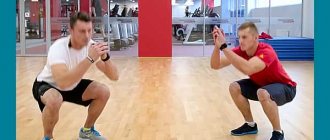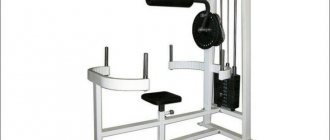Probably everyone was a little worried before going to the gym for the first time. How will I look among experienced bodybuilders? How not to make mistakes and use the simulator correctly? How to behave? In search of answers to these and related questions, dozens of forums were re-read and numerous videos were watched. And now that day has come - the decision to lead a healthy lifestyle has not only been made, but also confirmed by concrete steps (in the direction of the gym, of course). You have a program, you can distinguish fitness dumbbells from a gymnastics wheel, you look the same as everyone else, but for some reason almost every action you take evokes a sarcastic grin or murmur of indignation from other visitors. And although the gym is not the place to care about what others think of you, it is still better to know some rules and norms of behavior. This will make your stay there more comfortable and give you confidence. We want to introduce you to them.
Inspection trip to the hall
As with any other activity, there is no need to rush in your desire to start going to the gym. It is clear that time can destroy motivation, but this is precisely the way to test yourself. Have you decided to bulk up or lose weight? Great. But you shouldn’t immediately go to the gym and buy a membership. Many companies make money from those who purchase an annual pass, and after a lesson or two they become disappointed and stop participating. Therefore, in order to save money, understand the seriousness of your intentions, and also appreciate the hall itself, pay for a one-time visit first.
Come at a time when you intend to go regularly. You should not choose a Friday evening or a weekend - they will not give you the opportunity to judge the “load” on the hall during rush hour. Try to evaluate not only the availability of the exercise equipment and equipment you need, but also the little things - the serviceability and number of shower stalls, the reliability of the lockers in the locker room, the ventilation of the room, etc. If you liked it, you may think about buying a subscription. You almost strained your lower back on a rickety car - look for another option.
Where to start for a newbie in the gym?
Strength training for beginners in the gym is full of mistakes and troubles that can lead to injuries and zero results. Therefore, it is necessary to approach your training process .
Below are some instructions that will help you understand where to start building your workouts in the gym:
- Find yourself a training program with a detailed description, which will clearly outline recommendations for choosing the working weight on the barbell, resting between approaches and the duration of the workout itself, of course based on your goal (gaining mass, drying muscles, increasing strength endurance, increasing strength , losing weight , increase in aerobic endurance)
- Learn the technique of performing exercises that are found in the selected training program
- Adjust your diet in favor of increasing/decreasing calories, as well as choosing the right, healthy foods that form the basis of a healthy diet
- Buy a sports bag with which you will go to the gym; it must contain clean water, a change of clothes and shoes, and optional soap accessories/sports nutrition/wristbands/warming ointment.
- Any workout should begin with a warm-up (performing exercises with very light weights, jogging, swinging and bending) in order to avoid injury during training.
Where to start for beginners in the gym
This ends the list of basic safety requirements and rules for being in the gym.
If you find an error, please select a piece of text and press Ctrl+Enter.
Inventory
You often come across advice like the need to buy new sneakers before starting training. Supposedly they will serve as excellent motivation to start studying. The argument is, to put it mildly, dubious. If you want, old shoes will serve no worse than new ones, which you can buy when you get into it. And in general, it’s not worth buying things specifically for the beginning of your visits to the hall. Remember the point: you are working on your own health and creating an ideal body, not a sporty clothing style. Therefore, an ordinary non-synthetic T-shirt and shorts will be no worse than ammunition from well-known brands. Another thing is important - they should always be clean, do not forget to wash your things.
If the room has air conditioning, you can also take a sweatshirt to avoid catching a cold. Based on your training goals, you may need additional accessories, so it’s better to find out in advance whether the gym has them. Also, don't forget a bottle of water and a small towel to wipe off sweat (including on the benches after your activities). A watch with a stopwatch will also come in handy (it doesn’t have to be expensive - it won’t hurt if you accidentally break it). Player and headphones - according to preference.
Lesson on the topic: “Athlete etiquette. Sports and discipline."
Topic: “Code of the Young Olympian”
SPORTS ETIQUETTE - educational psychologist Elbekyan N.S.
Etiquette (French etiquette) is an established procedure for behavior somewhere.
The rules of the competition imply strict personal discipline and a serious attitude towards both the training process and one’s behavior in everyday life. The path taken by an athlete who performs according to sports rules will show him all the positive and negative sides of discipline and indiscipline, the desire for self-improvement and manifestations of laziness, a kind attitude towards people and the predominance of selfishness.
In the human soul throughout life there is a struggle between good qualities, thoughts, and motives with bad ones. This is the inexorable process of education, which is called personality development. Finding himself in an environment of maintaining a healthy lifestyle, a person acquires habits that can maintain his body, external characteristics, and internal organs of the body in a healthy state for many years. Finding himself in a positive, good-natured environment of communication, a person accepts the characteristic features and principles of such mental behavior, in which most of the time he is in a good mood, good mood, which in itself gives a positive progressive result at work, in school, in family relationships, even significantly extends its lifespan. This principle of surrounding the athlete with a positive attitude, maintaining a good sports atmosphere both in training and in everyday life is laid down in the Rules of Sports Discipline.
Athlete etiquette is observed regardless of whether the activity is carried out on a voluntary or professional basis.
Etiquette and sports discipline must be present and observed at all competitive, recreational and cultural events, regardless of the time and place of their holding. To understand and determine the norms of behavior of an athlete, there are the following sections of the “Rules of Sports Discipline”:
– rules of behavior in the sports training room;
– rules of behavior at competitions;
– rules of conduct at seminars, schools and swimming sports camps;
- rules of behavior in everyday life.
Rules of sports discipline
1. Respect for parents.
A sports training center, a sports club, a section, a federation, or any other organization conducts classes and trains children with the permission and approval of the parents who brought them to training, so the athlete is allowed to do only what is done with the knowledge and support of the parents/mother, father, grandfathers, grandmothers/. The athlete must constantly inform his parents about his training and plans for the future, showing respect for them. If the parents do not allow the athlete to attend training or continue training, such an athlete will not be allowed into the gym until a positive decision is agreed upon by the parents. In any life situation, an athlete is prohibited from showing disrespect towards his parents, or in private or in a group from speaking disrespectfully towards them.
2. Near the gym.
The gym has strict rules based on sports etiquette and the idea of decent human behavior in society. When near a gym, sports base, playground, or surrounded by people, the athlete is prohibited from demonstrating his negative habits, being drunk or drinking alcoholic beverages, including beer and low-alcohol drinks, smoking or carrying smoking items, cigarettes, cigarettes, cigars, matches, lighters, use obscene language when communicating with friends, coaches or strangers. The athlete must set an example of positive, good-natured communication in the team and personal self-discipline. Do not eat or drink at least one hour before training. The hall is intended for performing preparatory exercises and is equipped with carpets, mats and benches, and all kinds of visual aids can be hung in it.
3.An example for novice athletes.
An athlete must constantly train, in everyday life and in the gym, demonstrate to beginning athletes an example of a healthy lifestyle, the desire for constant self-improvement, help others and cultivate positive human qualities: reliability, devotion, stability, commitment, respect for elders and support for beginning athletes.
4.Skipping workouts.
The athlete is obliged not to miss training sessions without a good reason. If there is a good reason for this, the athlete is obliged to inform the coach in advance and take time off from this training session or several training sessions, and then inform the parents that the coach has been warned about the future absence of the athlete from training.
5. Late for training.
The athlete must come to training 15-20 minutes before the start of class. An athlete is prohibited from being late for training without a valid reason. If there was a significant reason and the athlete was late for the start of the lesson, he independently changes clothes in the locker room, approaches the training place, waiting for permission to start training. Having received permission from the coach to join the training, the athlete takes the place indicated by the coach (if the athletes are lined up, then at the end of the line). At the end of training or during the lesson, choosing a moment on his own, the athlete must approach the coach, apologize for being late, and openly state the reason for the delay.
6. Start of training.
Upon entering the gym, the athlete must greet his group mates without unnecessary emotions. After this, the athlete, with the permission of the coach, can sit on the gymnastic bench without attracting additional attention to himself. Before the start of the training session, movement around the hall or in the water is prohibited. Loud speech is prohibited in the gym. If a coach calls an athlete to communicate, the athlete must approach the coach and begin communication.
7. During training.
Throughout the entire training, the athlete must adhere to the rules of etiquette, respect the place for training and the general equipment of the gym, quickly carry out the trainer’s commands, show diligence and diligence in training, and try to gain as much knowledge and skills as possible. It is the duty of everyone involved to behave politely and with dignity, so that a favorable and harmonious atmosphere of mutual respect and a desire to help each other reigns during training. Everyone who crosses the threshold of the gym is one friendly family with a common goal. Any manifestations of disrespect towards a partner are unacceptable. Each participant in the training must apply the principles: the elder helps the younger, the strong helps the weak, an experienced athlete, through his personal example, shows the beginner a serious attitude towards each element of the training process. An athlete is prohibited from wearing body jewelry during training: chains, earrings, bracelets, rings, etc., so as not to accidentally injure himself or a friend with these items. An athlete must educate himself in the spirit of respect for those who have been practicing longer than you. Never get into arguments with them about learning basic techniques and other aspects of training, and respond with gratitude to the help of a senior. When a trainer shows or explains a technique during a lesson, you should listen silently, carefully and sincerely; at this moment, everyone present at the training is prohibited from talking. If the coach explains to you personally, do not forget to show that you heard and understood the advice by answering affirmatively. Athletes in training must diligently study everything that the coach gives them and work to their full potential. Free conversations in the gym and on the water are strictly prohibited, and work communication must be limited to wrestling terminology. During classes, do not distract those in the gym, do not engage them in conversation. The athlete is prohibited from using a mobile phone during training. Sports training uniform: shorts and a T-shirt, wrestling shorts are items of personal hygiene for the athlete, the athlete is prohibited from borrowing the uniform from another; if the uniform is not available, the athlete must strive to purchase it. If the training takes place in the fresh air, and the athlete cannot train and is present as a spectator, he is prohibited from drinking alcohol, smoking, eating, chewing gum, or doing other things that distract the athletes present at the training.
8. Traumatic behavior.
Swimming training sessions should always take place in conditions that exclude the possibility of injury. During training, an athlete is prohibited from performing any actions that entail dangerous consequences for others. It is known that any injury to a child is stressful for his parents. For warning: If a child was injured during training, the coach in whose class the traumatic incident occurred, the management of the Swimming Sports Training Center, the federation, and sometimes the entire sports team are subject to serious worries. In addition, in accordance with the legislation of the Russian Federation, an organization or sports institution is responsible for the life and health of students, pupils and employees of a sports institution during the training process. The circumstances surrounding the occurrence of injuries in children are created by impulsiveness, the desire to perform this or that action, and passion for training, which often makes the child forget about the danger that threatens him. Therefore, during training, observation of more highly qualified athletes plays an important role. The senior is obliged to set an example of discipline and safe behavior to the junior, and if he does not comply with safety requirements, stop the newcomer, reprimand him, and inform the coach. If you are reprimanded for violating a particular rule of conduct, do not take it as a personal insult; following the rules of etiquette is crucial for your safety and the safety of others, as well as for learning to swim in general. Each athlete is required to comply with fire safety rules.
9.Personal hygiene.
It is the duty of every athlete involved in the Republican Youth Sports School to monitor the cleanliness of the hall in which the training takes place, the condition of the equipment and inventory. Each athlete must provide himself with personal hygiene items in advance, have a personal towel, soap, replacement shoes, and other items and use them in everyday life, monitor the cleanliness of the body, hands, feet, absence of nails, have a neat hairstyle, neat appearance, monitor integrity and cleanliness of the training suit. An athlete who is unprepared in terms of hygiene is prohibited from attending a training session.
10.End of training.
If the coach announces the end of training, all athletes are required to stop performing exercises and follow his commands. If a general formation is announced for summing up, athletes are required to quickly walk or lightly run to take their place in the formation, according to etiquette. When summing up the results of the training, all participants are silent, listen to the summary information, and remember their homework. If an athlete has a question for the coach, he must raise his right hand up and with such hand signals show the desire to ask a question. Questions may only be asked after permission from the trainer. Leaving the gym at the end of training is carried out only with the permission of the coach; the athlete is prohibited from leaving the training hall or the water independently without a command. After the training session, movement around the hall or water is prohibited. At the end of classes, sports equipment should be put away in the designated area.
11. Leaving the gym during training.
If an athlete needs to leave the gym, he must ask permission from the coach and, upon returning, explain the reason for his departure.
12. Rules of behavior at competitions.
Competitions allow solving pedagogical, sports-methodological and socio-political problems. During sports competitions, the same pedagogical tasks are solved as during training in general, i.e. improving the physical, technical, tactical, mental and theoretical preparedness of the swimmer. However, all the changes occurring in the body exceed the level characteristic of training sessions. Competitions are one of the effective measures to improve an athlete’s fitness. The importance of sports competitions is especially great for the formation of the will to win - the main quality of an athlete. They also have a positive effect on viewers. Be persistent, always keep the fighting spirit and unbending will in your heart, do not succumb to weakness, fight until complete victory.
Swimming competitions are a bright, emotional spectacle. Satisfaction among coaches, athletes and spectators arises from the results achieved and high achievements. The quality of the competition depends on the behavior of both representatives and judges, as well as participants.
The competition participant must:
– prepare competition clothing and equipment in advance;
– do not be late for organizational events, the credentials committee, the medical committee, the opening of competitions, the beginning, the award ceremony;
– not being indignant at the judges’ decision to take victory and defeat for granted;
– on the territory of the sports facility, in the locker rooms, behave with dignity and culture, do not use obscene speech when communicating with others, do not drink alcoholic beverages, smoke, use drugs and other unhealthy substances specified in the Competition Rules;
– observe and maintain public order and generally accepted norms of behavior;
– comply with lawful orders of law enforcement agencies, the administration of the institution on the basis of which the event is being held;
– behave respectfully towards spectators and other participants of the event, service personnel, persons responsible for maintaining order, and avoid actions that create a danger to others;
– do not distract staff, judges, or referees with conversations;
– do not start aggressive actions or incidents towards an opponent, other participants, coaches, judges, spectators, fans, or other people around them;
– prepare for the swim in advance;
– Follow the rules of etiquette throughout the event.
Each athlete can be admitted to competitions only with the permission of the coach under whose guidance he prepared for them and the doctor. In competitions in which the swimmer must compete over several days, each subsequent performance must be sanctioned by the coach and the competition physician. If a competitor is injured, he is immediately removed from the competition.
Spectators at sporting events are also responsible for following the Rules of Etiquette.
13. Rules of conduct in swimming sports camps, training camps on the road.
During training camps, as a rule, several training sessions are held per day, and strict discipline is maintained. Training camps and camps are used by coaches to prepare athletes for subsequent, responsible competitions, selection, identification of sports data and sports readiness, educational work, and promotion of healthy lifestyle ideas in the team. At a centralized meeting, the coach can see every shortcoming of the athlete and has time to correct it, to point out to each student his shortcomings in basic technique, methods of studying and performing exercises. This is an enhanced training program with a more individual approach to each athlete. During the training, more in-depth work is carried out to strengthen the muscular corset, breathing exercises, work to further improve the necessary physical qualities, and the technique is examined in more detail. The athlete is under close medical supervision.
During the holidays, the child has free time, which sometimes has nowhere to go, and additional activities direct his energy in the right direction, and the child has something to do while improving his health and getting in good physical shape.. Younger people have the opportunity to communicate with more experienced athletes, they see seriousness the attitude towards the sport of both the coach and the senior students who form the backbone of the training group.
The seminar participant must:
– comply with all the internal regulations of the sports facility where the event is held;
– do not leave the territory of the base or camp without the permission of the coach, knowing that the coach is responsible to the parents who have entrusted the education and improvement of their child, and to government agencies, for the life and health of the athlete;
– attend all training sessions and other events offered by the TCB program;
– maintain daily contact with parents, inform parents about the planning and methods of training, your location, health status, foods consumed in the diet, relationships between comrades in the team;
– observe technical precautions when using household appliances;
– comply with fire safety rules, if any of the participants in the fire safety system violates these rules, stop and warn about the danger;
– be polite in dealing with comrades, help younger ones;
– do not consume alcohol and tobacco products;
– show maximum interest and effort in training.
14. Rules of conduct in everyday life.
Never drink alcohol or cigarettes.
A self-respecting athlete who works for results should not smoke or engage in other harmful habits that are incompatible with freestyle wrestling.
If you are injured, it is recommended to attend training as an observer.
Be grateful to your parents. They respect you for your work in training, rejoice at your victories, and worry about defeats with you.
Do not offend those who are weaker than you, come to the aid of everyone who needs it.
Always speak respectfully and respectfully about the coach while on the street, at school, at home, or in a public place. Prove by personal example the benefits of a healthy lifestyle and moral values brought up in a group led by your coach.
Try to study as best as possible at school and other educational institutions, complete the work assigned to you on time, treat your teachers and colleagues with care and respect. Provide all possible assistance to your parents with housework, do not upset them with unworthy actions, please your parents with your desire to succeed in everything. Make them proud of you.
Behavior rules
Let's get down to basics.
If you come to the gym for the first time, do not skip the introductory briefing. Safety rules, despite all the skepticism towards them, will sometimes protect you from injury. Also familiarize yourself with the rules for using simulators and remember how to use them correctly and what they are intended for. Even if you are sure that after watching thousands of training videos on Youtube you already know everything.
The gym is a place where many people exercise not just to keep fit. They need to be extremely focused, so try not to forget why you came. Want to talk about your workout program with a new friend or meet a beautiful, athletic girl? Please. But do it in such a way as not to disturb others. After exercising for more or less a long time, you yourself will understand how distracting and even annoying talking on the phone on the treadmill can be. Don't make too much noise and rattle pancakes. It is clear that it may happen that you simply cannot hold one of them in your hands on your first day, but you still shouldn’t jingle them all the time.
When working with free weights, remember that the main thing is not to overdo it. No matter how many people there are in the room, know that they are much more focused on contemplating themselves in the mirrors than on your attempts to bench press twice your own weight. And if this attempt is unsuccessful, then you will have to lie pinned down for some time. So be realistic.
When using benches and exercise equipment, wipe them down after yourself. Also, do not forget to put the equipment back in place after use, disassemble the barbell and dumbbells.
Don't be afraid to interact with other visitors. Ask those around you for help in backing up and never refuse to help yourself, even if you have a 10-second break left between sets. But only if you are asked to do so. If you see that someone is using a simulator in an unusual way or doing an exercise not in accordance with your idea of correctness, before giving advice, remember the saying about your charter and someone else’s monastery, and do not do it. The exception is situations that can lead to injury.
Be polite. A month of training does not make you a fitness guru, much less give you the right to look with contempt at the fat guy who recently came to the gym. Do not conflict with the administration and visitors, wait patiently for your turn, and do not use exercise equipment as shelves for your things. Just do what you came for and everything will be fine.
Basic rules of conduct and safety[edit | edit code]
Rules of conduct in the gym
Consequences of failure to comply with basic safety rules
The rules of conduct in the gym are aimed at providing visitors with safe and comfortable training and at the same time maintaining the equipment in working condition. Usually they are simple and understandable.
1. Return weights to their place
Returning work equipment to its place is a sign of courtesy towards those who will use it after you. Not everyone will like or be able (after all, there are many ladies among us) to remove ten 20-pound plates from a leg press machine. Return the dumbbells to the rack in their designated place and always remove the weights from the machine unless the person next to you asks to leave them in place.
2. Don't drop weights
Rules of conduct in the gym
Throwing weights onto the floor may cause injury to yourself or others, or damage equipment. In addition, such a noisy end to a set is in most cases a desire to attract the attention of others. Lower the weights to the floor as gently as possible, and only throw them if there is a clear risk of injury.
3. Dress appropriately
Dress taking into account two parameters - to make you comfortable and to make others comfortable. A simple T-shirt, simple sweatpants and - here we can make an exception - good sneakers. Shoes should be rigid-soled, have a slight heel rise, and are high enough to stabilize the ankle. This will be very useful for you, for example, in squats with a barbell.
4. Wipe off sweat
You will notice that many people come to training with a small towel. Wipe the bench after yourself, or better yet, lay it on the bench before approaching. You don’t want to lie on the sweat of other people, so you shouldn’t give them such a “gift” either.
5. Keep your distance
This concerns primarily safety precautions, as well as invasion of the personal space of other people. Try not to block the reflection if someone is practicing in front of a mirror.
6. Change your shoes
Carry a change of sports shoes with you to avoid dust formation.
Unspoken rules of etiquette[edit | edit code]
1. Conversations
Do not talk to the person while he is doing the exercise. It's very distracting and he probably won't listen to you anyway. Wait until the end of the approach and then ask your question.
2. Let others join you
It is simply impolite to refuse. The exception is if it would interfere with your training, such as if you have to change the weights too much or if you have a program with very short breaks between sets.
3. You are not transparent
Walking or standing directly in front of the person doing the set will interfere with their concentration. People can look in the mirror to improve their balance and form, especially during overhead presses, squats, deadlifts, and so on.
4. Ask permission
Always ask permission to share equipment that is already occupied. It is rude to simply sit on a bench or exercise machine that another person has just gotten up from. Ask: “Are you finished?” Don't ask someone whose weights are very different from yours in one direction or another to work with the equipment, because changing weights will take too much time between sets. Ask him how many sets he has left and wait for the set to finish, or choose a different machine and exercise.
5. Lively conversations
Don't pester people with your conversations. Typically, they come to the gym to work out, not to talk, and are completely focused on themselves. Chat after training if you feel that someone needs it.
6. Don't use a lot of equipment at once
You shouldn't take up a whole row of benches or exercise equipment unless the room is empty and no one else needs them.
7. Insurance
Don't automatically run up to someone and help just because you think they're having problems. Heavy reps are the most productive and you can ruin a person's set. Get ready to help IF you are asked to do so, but without acting on your own.
8. Abuse of assistance
Don't ask anyone to help you if you can't handle the weight on your own to begin with. Since your assistant is getting a powerful lower back workout while you're doing bench presses, you might want to re-evaluate your lifting weights.
9. Comfort zone
Don't place your bench too close to other people's benches. Some exercises require a large work space, and many ladies train quite seriously, and you can interfere with them.
10. Reset the weight
After completing a set on the machine, return the stopper to the position in which the previous person worked. This will demonstrate your familiarity with gym etiquette and basic politeness.
11. Be tactful
It's not nice to laugh at others just because they can't lift as much as you. Remember, there will always be someone who will lift more than you.
12. Help
If someone asks for help, don't refuse. If you feel you can't do it—for example, if too much weight is being used—don't hesitate to let the person know.
13. Scream
Try not to shout too much while working, this can confuse others, and sometimes just make you laugh. Sometimes it's necessary, but if you're screaming while doing wrist curls, there's something wrong with you.
14. Sound volume
Don't talk too loudly around people exercising. Believe me, you are not as interesting to others as you think.
15. Perfumery
You should not use perfume before training - the resulting mixture may not smell very pleasant. If you train seriously, you still cannot avoid the smell of sweat. Better just take a shower before the gym. And over time, when you normalize your diet, your smell will noticeably improve.
Conclusion
You are a newbie. So be a beginner - because there is no other option. You cannot become different overnight, you can only pretend. But the effort is not worth the benefit. Dress like a beginner, train like a beginner, act like a beginner, don't be shy to ask and learn. Remember: everyone in this gym has once been in your position, and each of them will understand and appreciate your efforts in mastering a new field of activity.
What not to do in the gym
The latest issue of Men's Health magazine provided the following list of things not to do in the gym as an educational guide for newbies:
- Step over the bar. And it’s not a matter of ethics – that’s just the way it is. Whether you take this superstition into account or not is up to you, but maybe it’s better not to risk it again? Moreover, it is not difficult to get around it.
- Push the barbell or dumbbells lying on the floor with your feet. Here everything is simpler and clearer - you could walk anywhere in your sneakers, but someone takes them with their hands.
- Leave the projectile unassembled. Once you've worked out, take off the pancakes. Think about others, because after you a girl may start training who will not be able to dismantle a 200-kilogram barbell.
- Throw projectiles onto the floor or racks. Excessive noise is very annoying, and the equipment must be treated with care.
- Disassemble the bar without asking. Before you “customize” something for yourself, ask those around you if they are doing it.
- Go to the gym without taking a shower. After a hard day at work, you may not smell, but after a couple of approaches the smell will appear. You should also be careful with perfume - this is after all a hall, not a disco.
- Occupy a power rack to perform exercises not intended for its purpose. And in general, this applies to any simulator.
Gym Safety
Now let’s move on to general safety precautions when in the gym:
- You shouldn't smell bad; take deodorant , shampoo, towel, and shower slippers with you.
- water with you the water-salt balance will also be disrupted , as a result This will disrupt the neuromuscular connection, which is why you simply won’t have the strength to continue exercising further.
- Clothes should be clean, not torn, and comfortable, there should be no discomfort during exercises, clothes should not restrict movement, synthetics , the skin should breathe. shorts are best ; whoever prefers, wear a T-shirt or T-shirt on top, but not a warm jacket. For girls, we recommend clothing specially designed for training in the gym: for the bottom - leggings , breeches, trousers, shorts, for the top - a T-shirt, T-shirt, bra, you can buy it at any sports store , for example, at Sportsmaster.
- Use sneakers or sneakers in the gym, but not slippers (flip-flops). Many athletes have already suffered because of slippers, they are slippery, they the ankle , as a result, the joint moves, all this inevitably leads to injury. shoes , as well as clothes, in a sports store, and not in the market, where they are of worse quality.
- Don’t mindlessly grab at everything in the gym, find a fitness instructor , ask him to draw up a training plan, ask him to show you the technique for performing the exercises that interest you.
- Don’t forget to disassemble the barbell correctly; you should not remove more than 1-2 weights from one side of the bar, otherwise you will overweight and you or those around you will be injured.
- Do not interfere with those around you when working out in the gym, first of all, this is as follows: when a person is doing an exercise, do not come up and ask “how much longer do you have?” as soon as the person doing the exercise, ask, in addition, do not “loom” before your eyes, and in the background while the athletes are performing an approach, this is very distracting and does not allow them to fully concentrate on performing the exercise.
- Before training, always warm up , if necessary, use warming ointments . Cold muscles and ligaments are very easily injured during exercise. Warm-up in the gym should be not only before the start of all exercises, but also before the start of the main (working) approach to the exercise, that is, if you perform a barbell bench press on a horizontal bench, 4 sets of 8 times with a weight of 80 kg , then the warm-up will look like this: 1x15 - empty bar, 1x12 - 40 kg, 1x10 - 50 kg, 1x8 - 60 kg, 1x6 - 70 kg, working sets 4x8 - 80 kg.
Technical exercise in the gym
Don’t forget about the cool-down, stretching the muscles after training promotes their speedy recovery , and also increases the potential for strength and muscle growth (the more a muscle stretches, the more it contracts, which means the greater the training effect will be from performing the exercise).
We draw your attention to warm-up and cool-down, this is something that many, both beginners and even experienced athletes, neglect in the gym, thereby exposing their musculoskeletal system and muscles to various injuries , ranging from stretching of muscle fibers to complete tendon separation.











